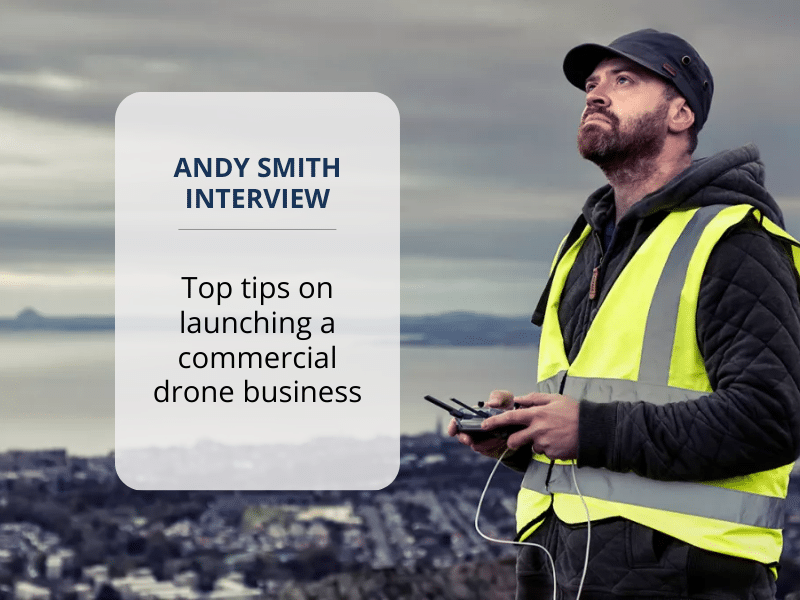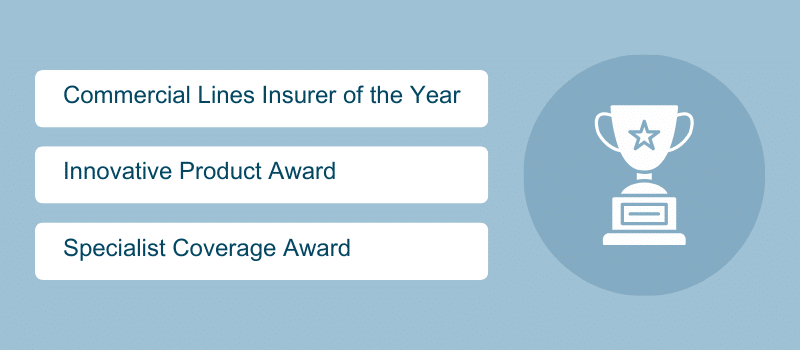
We’ve lost count of the number of recreational customers who have told us they dream of setting up their own commercial drone business over the years. After all, who wouldn’t want to earn a living doing something they love?
But, for many, taking the first steps can be a daunting process.
So, this month we decided to sit down with Andy Smith, author of ‘How to launch your commercial drone business’, to get his thoughts and top tips on starting out, based on his own personal experiences.
Can you tell us a little bit about your background and your own experience in launching a commercial drone business?
My background is in advertising and design, and it was in my capacity working as a Creative Director for a marketing agency that I stumbled across drones.
I’ve always been in awe of what photographers and videographers can do, but never had the urge to pick up a camera before. But a few years back, I was working as a Creative Director on set for a video shoot where they were using a DJI Phantom 3. It was the first time I had seen one, and whilst the machine itself intrigued me, it was seeing the live feed through the iPad that really captured my imagination. Seeing the world like that, like a bird, was mesmerising. It reminded me of dreams I had where I was flying. I was hooked immediately.
I found my mind constantly drifted to drones, and after about six months, I finally gave in to my obsession and purchased my first drone, the original DJI Mavic Pro.
I spent another six months or so practicing. The flying of the drone actually came quickly. I think anyone who grew up playing games consoles should pick up that quite fast, but mastering the camera was a huge learning curve for me. Learning about ISO, shutter speeds, aperture, as well as shot techniques and post-production, that took a lot of learning.

In parallel with this, I did a distance learning course in preparation for my PFCO tests and got my commercial license from the CAA In late 2017. I then applied my marketing experience to self-promoting my drone business, and found that some of that worked, and some of it didn’t. But a process of trial and error helped me win clients and build my business from there.
I love it! If the work wasn’t coming in, I would do it as a hobby anyway. But thankfully it is, and I am able to make a living from it.

What’s the one bit of advice you wish someone had given to you when you were first starting out?
Take time to learn how to use the camera properly. Really get to grips with it, perhaps using a standard digital camera as well, so you’re not trying to learn on the fly. It will make your work so much better.
What are the main pitfalls of launching a commercial drone business that you feel people should be aware of?
There are so many. But I think undervaluing yourself is the biggest one. I think drone operators often undersell their services or try to build a business by starting cheap. But I think there’s no going back from there, and I would strongly advise against trying to win the race to the top by undercutting fellow operators.
When you factor in shoot planning and paperwork, travelling to and from sites, flight logs and post-production, you realise there is lots of things you need to do before and after each shoot. You also need to have insurance, obtain and refresh your permissions and keep your flying time up. So, you need to factor that into your fees. And also, you carry a lot of responsibility in terms of personal and public safety, putting yourself under public scrutiny every time you fly.
So, I think recognising all of that, and being confident to charge a good price is key. If a client wants it cheaper, politely decline and move on to another client who values what you do.
There are plenty of drone operators out there trying to monetise their skills. In your opinion, what’s the best way they can stand out from the competition?
It sounds a bit obvious, but being good at what you do and how you do it is the best way to stand out. Both in terms of the quality of work, but also service. Clients will pay more for someone that they trust will give them great work with minimum hassle.
What are your top tips for creating a great website to showcase your work?
I see a lot of drone operators who list a vast range of services on their website. Everything from video, photography to mapping, roof surveys and thermal imaging, but with very little examples to show.
I think clients will always end up on your website at some point before they commit to hiring you, and they will want to see your work. So let the work do the talking. Great videos, well edited, great images. And be selective. Only put the best up there. 10 great images are better than 30 average ones.
Testimonials are great too once you are established. Ask clients to write a sentence or two to sing your praises. This helps build trust. Although, I must confess, I need to be better at this myself.

How can you leverage social media to greater promote your work, and how do you know which is the best social media platform for you?
I have mixed feelings about social media. I think you need to do it, and you need to make it part of your workflow, but nothing beats good old-fashioned human contact and word of mouth recommendations.
For me, social media is a great way to keep yourself present in people’s minds. But I think it should be a supportive tool, rather than a proactive one.
Coming back to your question, the best platform varies depending on what you want to achieve. I’d say LinkedIn is the best for overtly selling your services. It’s a professional networking platform so there’s no taboo about self-promotion. It’s what everyone else is there for too. So don’t be shy of more direct approaches to potential clients through LinkedIn messenger and/or more overt promotion of your services.
Instagram is good for general awareness but be wary of mass marketing to the entire world. Make sure your posts are wisely tagged and relevant to your operational area. Make sure you aren’t trying to appeal to fellow drone operators on the other side of the world. They’re never going to hire you.
Facebook is a bit weird these days. I think users are drifting away. On the other hand, it’s a great way to share posts to relevant industry groups and local interest pages.
In terms of video, I use Vimeo to showcase my work on my website, as it seems to present them in a much more professional way. But I also have everything on YouTube, as their affiliation with Google offers far greater reach and ensures your videos rank higher in search engine results.
In short, I think all the main social media platforms are useful, if used in the appropriate way. Try not to waste too much time on them. Get in, post, get out, and concentrate on fundamentals of networking for better results, and let your social media feeds work in the background.
In your experience, what is the best way to identify and connect with your target audience?
The best way is to think about who might need your work. Put yourself in their shoes.
In my book, I focus on photography and videography. So, identifying who works in a position to hire or purchase those things is key. Broadly, it’s people who work in media at a managerial level. You can connect with them via their professional contact methods, so long as it’s in the public domain. You can email them via their companies’ website, or through the professional social media network LinkedIn. A simple introduction of you and your work is the best way to start, then re-engage with them at regular intervals, using the opportunity to showcase your latest work. This begins a dialogue, builds trust, and keeps you front of mind.
So, you’ve recently finished writing ‘Launch Your Commercial Drone Business’. What’s the one thing you’d like readers to take from the book?
The one thing I would say is to be proactive in making your best work and sharing it with the people who might want to hire you to do it. I think that’s not only the best way to grow your business, but also the best way to enjoy what you do.
Keep it simple. Do the kind of work you love, and make sure the kind of people that might want it, see it. Keep doing that. It will work.


